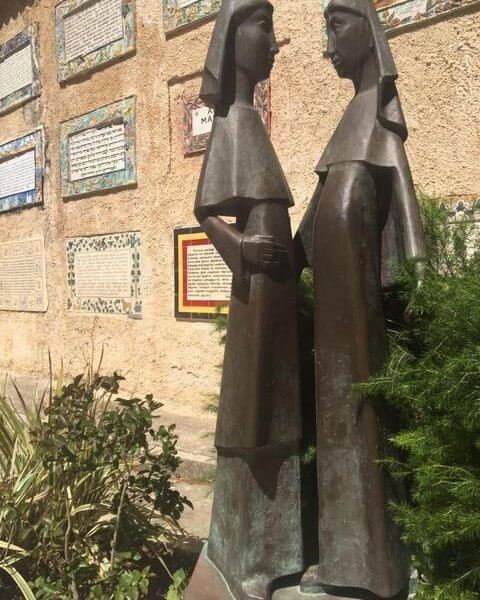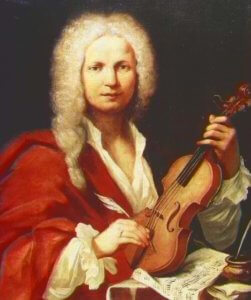
The Magnificat Is Emmanuel’s Song
Today, we read in Luke’s gospel of Mary’s visit to her cousin, Elizabeth. Elizabeth and Zechariah the priest are long past their child-bearing years when the Angel Gabriel tells Zechariah that baby John the Baptist is coming. Zechariah is incredulous, of course, so Gabriel makes him speechless until after John is born and named so that his doubt won’t spill out on anyone else.
 And while Mary is astonished that she — an unmarried teenage girl — could be carrying God into the world, she sees it as a sign of God’s enormous favor. This morning we hear the moment that the cousins greet each other, as you see in the photo of the bronze statue on the cover of your bulletin:
And while Mary is astonished that she — an unmarried teenage girl — could be carrying God into the world, she sees it as a sign of God’s enormous favor. This morning we hear the moment that the cousins greet each other, as you see in the photo of the bronze statue on the cover of your bulletin:
When Elizabeth heard Mary’s greeting, the child leaped in her womb. And Elizabeth was filled with the Holy Spirit and exclaimed with a loud cry, “Blessed are you among women, and blessed is the fruit of your womb.”
Elizabeth then wonders how she herself could be so blessed, that God’s mother has come to visit her. As soon as Elizabeth heard Mary’s voice, she says, baby John leapt for joy in her womb. Before Mary sings the Magnificat, Elizabeth joins her own belief with Mary’s: Blessed is she who believed that there would be a fulfillment of what was spoken to her by the Lord. Both women are carrying children who were unlikely for physical, economic, cultural, political, and even religious reasons. God brought surprising abundance into unlikely places. Both broadly political and completely personal, the Magnificat is a proclamation of God’s limitless power of liberation and reversal.
Tough to Sing
But parts of the Magnificat can be tough to sing. It’s easy to rejoice when God fills the hungry with good things, but the parts about scattering the proud in the thoughts of their hearts, and bringing down the powerful from their thrones feel a little spiteful and shortsighted. After all, the mere fact of civil leadership does not necessarily indicate cruelty or injustice, and the chaos of toppled governments never makes things better for those who are struggling. And I couldn’t sing the part about filling the hungry with good things while sending the rich away empty. That just felt arbitrary and mean, not abundant and generous in the way I understand God’s economy. After all, I don’t think that our God would engage a great reversal that puts different people on the bottom and makes other people hungry. That’s not consistent with God’s loving, abundant activity in the world.
First, where was Mary in all of this? Was she an innocent teenager, swept up against her will in God’s grand plan of salvation — a powerless subject of decisions made for her by others? Well, maybe. But only for a minute. Mary chose her response to God’s invitation, focusing on the many ways she was blessed, not on what she lacked according to standard understandings of the personal or economic power of an unmarried, pregnant Jewish girl in first century Judea.
Mary is All In
 Gabriel greets Mary by name, telling her that God is with her — that she is even favored by God. Mary is not sure at all about this. Luke’s gospel tells us that she was greatly troubled at his words and wonders aloud what on earth kind of greeting this might be. But she hears him out. She asks good questions. She evaluates Gabriel’s answers. And then she says she’s all in: I am the Lord’s servant, she says. Let your word to me be fulfilled.
Gabriel greets Mary by name, telling her that God is with her — that she is even favored by God. Mary is not sure at all about this. Luke’s gospel tells us that she was greatly troubled at his words and wonders aloud what on earth kind of greeting this might be. But she hears him out. She asks good questions. She evaluates Gabriel’s answers. And then she says she’s all in: I am the Lord’s servant, she says. Let your word to me be fulfilled.
But in this conversation with God’s messenger, the ball is still in Mary’s court. What if she hadn’t been home when Gabriel stopped by? What if she’d said she had to wait until the bread was out of the oven, or until she finished up this big project at work? Or that she would have to get back to him when she freed herself up from some other commitments, like her betrothal to Joseph? What if she’d just said no? I wonder if God had a backup plan for human salvation. But Mary says yes to God through Gabriel, and then lets loose with a mighty song of joy. The Magnificat is not the song of a victim of force or coercion. The Magnificat is not a song of resignation to the inevitable force of empire. The Magnificat is a song of triumph, fulfillment, and reversal.
Mary’s joyful response wasn’t focused on the hard parts — bearing the Messiah in poverty under Roman occupation while betrothed but not yet married to Joseph. Mary was rejoicing that God lifted her up and satisfied her hunger with good things. The Magnificat is the knowing and powerful song of someone who has already entered into partnership with God:
My soul proclaims the greatness of the Lord.
My spirit rejoices in God my Savior.
For the Mighty One has done great things for me.
He has lifted up the lowly,
filled the hungry with
good things.
This is not a wish list or expectations for the future — this is a list of the great things God has done that Mary saw the minute that she said yes to God. Mary doesn’t mention the money and power she doesn’t have, or her youth and inexperience. Instead, she sings of God’s favor and great abundance.
Connection to Our Hopes
The Magnificat has a wonderful connection to our hopes for Emmanuel Church, as we live into our new life with Newport Classical and imagine expanding our hopes to include our feeding ministry in our thriving community of Emmanuel. St. Martin-in-the-Fields in London is well known both as a concert and recording venue for great sacred music and as a worshiping community deeply engaged in social outreach, and is a model for Emmanuel’s potential to serve the community and change lives.
 I read a 2014 article this week by Sam Wells, the rector of St. Martin-in-the-Fields, about St. Martin’s dual identity that relates directly to the Magnificat — and Mary’s great choice to live into abundance, rather than limits of fear and scarcity. Sam Wells — no relation of course — writes about the composer Antonio Vivaldi, who lived from 1678 to 1741 in Venice and wrote one of the great musical settings for the Magnificat. Vivaldi was also a Catholic priest and a violinist who worked as the choirmaster at a local orphanage that supported its operations through performances of his compositions. One of those compositions was the Magnificat — Mary’s song.
I read a 2014 article this week by Sam Wells, the rector of St. Martin-in-the-Fields, about St. Martin’s dual identity that relates directly to the Magnificat — and Mary’s great choice to live into abundance, rather than limits of fear and scarcity. Sam Wells — no relation of course — writes about the composer Antonio Vivaldi, who lived from 1678 to 1741 in Venice and wrote one of the great musical settings for the Magnificat. Vivaldi was also a Catholic priest and a violinist who worked as the choirmaster at a local orphanage that supported its operations through performances of his compositions. One of those compositions was the Magnificat — Mary’s song.
How did the children in the orphanage sing Mary’s song? Vivaldi composed music for the choir to perform, drawing audiences to support the institution through donations and bequests. Vivaldi was giving young girls a song to sing, and offering them a chance to bring about their own redemption and the liberation of others like them. They were truly singing Mary’s song, incubating the gospel of transformation just as Mary, in her womb, was incubating the word of God.
Vivaldi’s business plan has a lot in common with Emmanuel Church’s space collaboration with Newport Classical, serving as a worshiping community, center for social outreach, and sacred music concert venue. We can live into this dynamic form of social enterprise that begins with celebrating what we do have, rather than lamenting our disadvantages. It’s a philosophy of abundance like Mary’s own song. Along the way, we’ll practice partnership, discipline, and teamwork, while remembering that our business sense and entrepreneurial imagination are just a few of the great things that God has given us to work with as partners with the Holy Spirit in Emmanuel’s future.
Antonio Vivaldi forged a creative partnership among cultural, charitable, and commercial cultures, finding a way to harmonize those sometimes discordant melodies. These harmonies can help us to hear Mary’s song of the great generosity of God’s economy, where the lowly are lifted up, and everyone is filled with good things. And who better than Emmanuel — the Church of the People — to sing Emmanuel’s own mother Mary’s song of a world where everyone does better and no one does worse? In a seaside metaphor suited to our own context, a rising tide lifts all boats.
What if scattering the proud in the thoughts of their hearts breaks open their hearts and allows them to see others in a new way? And what if God casts the powerful down from their thrones so that they can join the community? What if Mary’s song is about the great generosity of God’s economy, where the rich share their resources, and go home with lighter pockets and hearts filled with love and connection? In this Advent season, when we’ve remembered both hopeful expectation and penitence, let’s ask ourselves new questions and see ourselves, and the world, in a new way. Amen
